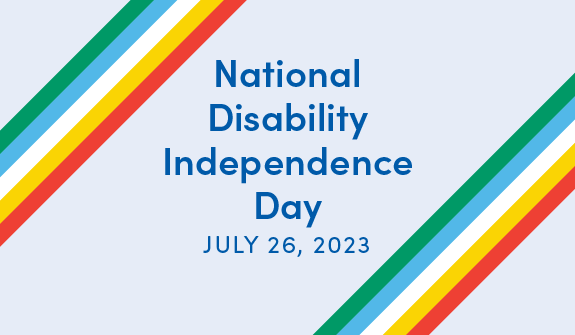Read time: 5 Minutes
Every year on July 26, the United States celebrates National Disability Independence Day, commemorating the passage of the Americans with Disabilities Act (ADA). The ADA, signed into law in 1990, is the nation’s first comprehensive law that prohibits discrimination against people with disabilities.
Americans with Disabilities
While monumental, the signing of the ADA was just the beginning. There is still much work to be done for disability rights, including pay equity, marriage equality, accessibility, and more. In the United States, about 1 in 4 adults has some type of disability. “People with disabilities are twice as likely to live in poverty and four times more likely to experience homelessness. They experience higher rates of unemployment, and those who are employed earn less than workers who do not have a disability. They also face poorer health outcomes and barriers in access to healthcare.” (SETWorks Blog)
Experience of Tech Women with Disabilities
Given that people with disabilities make up such a large proportion of the population (about 16%, globally), it is crucial that more technologies are created by and for people with disabilities, to ensure that their unique experiences and perspectives are included in technology design.
However, the current state of the tech workforce continues to push women with disabilities out of the workforce, as they are experiencing higher burnout and a lower sense of belonging. Results from our 2022 Technical Equity Experience Survey (TechEES) show only 50.9% of women with disabilities indicate they have a sense of belonging at work, while women technologists with disabilities are 1.3X more likely to experience burnout than men with disabilities.
In addition to discrimination, workers with disabilities earn only $0.87 cents for every dollar that non-disabled workers earn. Pay equity is vital for people with disabilities to be financially independent and cover expenses such as home and transportation accommodations, healthcare, personal services, and more. Unfortunately, almost a quarter (23.4%) of companies in our 2022 Top Companies for Women Technologists report have no pay equity policy, whatsoever.
Challenging Ableism to Create a More Inclusive Tech Workforce and World
The disability community is highly diverse and deserves recognition and accommodations for each unique situation. This cannot be accomplished without a proactive and inclusive tech workforce that allows people with disabilities to have a say in the solutions and innovations that are being engineered.
By prioritizing accessibility, equal pay, and supportive work environments, we can ensure that people with disabilities are not only welcomed but also empowered to thrive in the tech industry. Embracing their unique perspectives and contributions will not only enrich the field but also lead to more innovative and inclusive technologies that benefit everyone.
On this National Disability Independence Day, join us in our commitment to continue learning, challenge ableism, and create a future where everyone has equal opportunities to succeed and make a positive impact. Check out the resources below for continued learning.
Resources:
- 33 Ways to Celebrate the 33rd Anniversary of the ADA
- “An Overview of the Americans with Disabilities Act”
- How To Be Anti-Ableist And Promote Disability Inclusion
Disability Activists You Should Know
- Imani Barbarin is a disability activist and communications specialist. Follow her on Twitter, Instagram, and Tik Tok.
- Alice Wong is a disabled activist, writer, media maker, and founder of the Disability Visibility Project, an online community dedicated to creating and sharing disability media. Follow her on Twitter and Instagram. Check out her latest book, Year of The Tiger: An Activist’s Life.
- Judith Heumann, widely regarded as “the mother” of the disability rights movement, was involved in advocating for the passing of the Americans with Disabilities Act (ADA) and has been fighting for disability rights for decades. Judy passed away March 4, 2023, but her legacy lives on!
- Miz Tee Franklin is a Black, queer, disabled, and autistic tv and comic book writer for the Harley Quinn and Archie Comics. She is also a bestselling award-winning comic writer for her comic Bingo Love. Follow her on Twitter and Instagram.
- Haben Girma is a deafblind human rights lawyer, disability advocate, the first deafblind graduate of Harvard Law School, and author of Haben: The Deafblind Woman Who Conquered Harvard Law. Follow her on Twitter and Instagram.
Read more posts from the thread Keep an Eye Out for These Not-so Obvious Signs of Burnout

